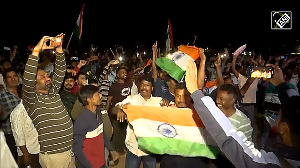I cannot comprehend how the United States can ignore the irrefutable nexus between the Pakistani military's intelligence ISI and the terrorist group Lashkar-e-Tayiba as once again conclusively established by the testimony of Pakistani American and Lashkar operative David Coleman Headley at the ongoing trial of his handler Tahawwur Hussain Rana in Chicago, a US Senator has said.
Maryland Democrat Ben Cardin, a member of the Senate Foreign Relations Committee, said, "Clearly, the United States has a great interest in Pakistan" and that no one is "suggesting that can we ignore Pakistan."
But speaking at a hearing of the Foreign Relations Committee, Cardin said, "There are mixed signals here that are very, very troubling and that the United States needs to be able to have alternatives for carrying out its foreign policy in that region."
"Let me sort of underscore this," he said. "Pakistan is critically important for many reasons, not the least of which its nuclear capacity and the current safe haven for terrorist organizations and the importance of staging for us in Afghanistan. But it's also clear that LeT is a terrorist organization; the United States has a pretty -- should have a pretty clear position as to how we deal with terrorist organizations. And we should leave no ambiguity."
Cardin asserted that "Pakistan has to choose on which side it is on in the war against terror, and they're giving mixed signals today. It's not just the bin Laden circumstances. But in Chicago at the David Headley trial, a confessed Pakistan-American terrorist, testified that ISI and LeT coordinated with each other, and ISI provided assistance to Lashkar financial, military and moral support."
"Now, I don't know how the United States can just ignore this. It seems to me that we need to be able to confront Pakistan's support for terrorist organizations. And US taxpayers are providing support to Pakistan today. And that's an issue that will come to the attention of the United States Congress."
Cardin warned, "So it's going hit a crisis point if we cannot get Pakistan to support the war against terror, including terrorist organisations within their own state."
He then asked Christine Fair, one of the experts testifying before the Committee, what choices the US had, and she replied, " First of all, we need to take some responsibility. Pakistan has never given us anything but these signals. Right? We dismissed Lashkar-e-Tayiba for years as an India's threat. Pakistan never turned its back on Laskhar-e-Tayiba."
Moreover, she noted, Pakistan did a U-turn on its U-turn with the Taliban very early in the conflict, and there were no consequences because we had other preoccupations that did not allow us to have the fortitude that we should have had to be more forthright with Pakistan."
Fair said, "I'll point out that, to my utter astonishment -- well, I wasn't astonished, I was disappointed -- that the Secretary of State certified that Pakistan was in compliance with the conditionalities on security assistance vis-a-vis Kerry-Lugar-Berman (aid bill, which provides Pakistan with $1.5 billion annually over a five- year period). This was done on March 18 despite full knowledge that we were engaging in an operation to get bin Laden, despite full knowledge that the Pakistani state has continued to harbor and assist Laskhar-e-Tayiba among other elements."
"So we have to be honest and self-reflective. Why is it that we have been unable to actually enforce what already is in our own legislation? The reality is, however, we don't have a lot of options with Lashkar-e-Tayiba. We know from the Raymond Davis affair it's very difficult to operate in that terrain. The ISI knows what we're up to, and they're seeking to undermine it."
But Fair said, "I do think we have options to contain it. Let me put something somewhat obnoxious on the table. Lashkar-e-Tayiba's largest theater of operations for its support is in Pacific Command where we actually have a lot of assets and we have a lot of partners. We should be aggressively targeting Laskhar-e-Tayiba's assets in the Pacific Command, in Europe and North America. They can't do what they do without outside support."
"And so while it may sound somewhat disappointing that we don't have more aggressive options, I think we have more options than we believe," she said.
"They can't do what they do without outside support, and so while it may sound somewhat disappointing that we don't have more aggressive options, I think we have more options than we believe."
When Cardin asked Fair flat out if the ISI was supporting and coordinating its activities with the LeT, Fair said, " It certainly is. Pakistan is the arsonist and it's the fireman. It will help us on groups that it shares the sense that it is a threat, but yes, it is my assessment it is continuing to work with LeT in a -- in a very close way."









 © 2025
© 2025